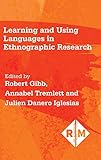Learning and Using Languages in Ethnographic Research / ed. by Robert Gibb, Annabel Tremlett, Julien Danero Iglesias.
Material type: TextSeries: Researching MultilinguallyPublisher: Bristol ; Blue Ridge Summit : Multilingual Matters, [2019]Copyright date: ©2019Description: 1 online resourceContent type:
TextSeries: Researching MultilinguallyPublisher: Bristol ; Blue Ridge Summit : Multilingual Matters, [2019]Copyright date: ©2019Description: 1 online resourceContent type: - 9781788925914
- 9781788925921
- 306.442 23
- P35 .L43 2020
- online - DeGruyter
| Item type | Current library | Call number | URL | Status | Notes | Barcode | |
|---|---|---|---|---|---|---|---|
 eBook
eBook
|
Biblioteca "Angelicum" Pont. Univ. S.Tommaso d'Aquino Nuvola online | online - DeGruyter (Browse shelf(Opens below)) | Online access | Not for loan (Accesso limitato) | Accesso per gli utenti autorizzati / Access for authorized users | (dgr)9781788925921 |
Frontmatter -- Contents -- Acknowledgements -- Contributors -- 1. Introduction -- Part 1: Learning Languages in Ethnographic Research -- 2. Language Learning as Research Rehearsal: Preparation for Multilinguistic Field Research in Morocco -- 3. Emergent Collaborations: Field Assistants, Voice and Multilingualism -- 4. Learning Language to Research Language in Two Tanzanian Secondary Schools -- 5. ‘Demystifying’ Multilingual Fieldwork: On the Importance of Documenting and Reflecting on Language Learning in Ethnographic Research -- 6. Dealing with Diglossia: Language Learning as Ethnography -- 7. Language Learning and Unlearning in Ethnographic Fieldwork: ‘Speaking Asylum’ and ‘Doing Small Talk’ -- 8. One Language, Two Systems: On Conducting Ethnographic Research Across the Taiwan Strait -- Part 2: Using Languages in Ethnographic Research -- 9. Breakdowns for Breakthroughs: Using Anxiety and Embarrassment as Insightful Points for Understanding Fieldwork -- 10. Andean Ethnography and Language Learning: Reflecting on Identity Politics and Resistance Strategies of the Chilean Aymara -- 11. How I Tried to Speak a Language Like a ‘Native’ and How this Influenced my Research -- 12. ‘The Language is Mine. The Accent is Yours’: Doing Fieldwork in Angola -- 13. Being ‘Proficient’ and ‘Competent’: On ‘Languaging’, Field Identity and Power/ Privilege Dynamics in Ethnographic Research -- 14. Plurilingual Focus, Multilingual Space, Bilingual Set-up: Conducting Ethnographic Research in Two Catalonian Schools -- Part 3: Institutional Contexts and Challenges -- 15. Listening, Languages and the Nature of Knowledge and Evidence: What We Can Learn from Investigating ‘Listening’ in NGOs -- 16. Becoming a Multilingual Researcher in Contemporary Academic Culture: Experiential Stories of (Not) Learning and Using Languages -- 17. Conclusion -- Index
restricted access online access with authorization star
http://purl.org/coar/access_right/c_16ec
Learning and Using Languages in Ethnographic Research breaks the silence that still surrounds learning a language for ethnographic research and in the process demystifies some of the multilingual aspects of contemporary ethnographic work. It does this by offering a set of engaging and accessible accounts of language learning and use written by ethnographers who are at different stages of their academic career. A key theme is how researchers’ experiences of learning and using other languages in fieldwork contexts relate to wider structures of power, hierarchy and inequality. The volume aims to promote a wider debate among researchers about how they themselves learn and use different languages in their work, and to help future fieldworkers make more informed choices when carrying out ethnographic research using other languages.
Mode of access: Internet via World Wide Web.
In English.
Description based on online resource; title from PDF title page (publisher's Web site, viewed 25. Jun 2024)


